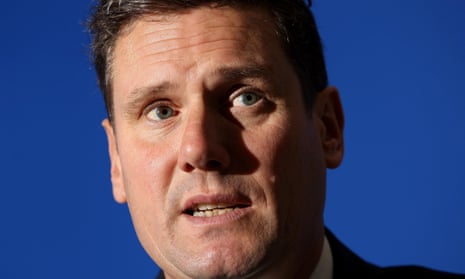Labour will not block a parliamentary vote to trigger article 50 but would insist on first knowing the government’s plans for how it would proceed with leaving the EU, the shadow Brexit secretary, Keir Starmer, has said.
Starmer did, however, say that the party could try to amend any bill to begin the process of beginning Brexit, and would seek to preserve access to the EU’s customs union and elements of the single market.
He was speaking before the government’s official response in the Commons later on Monday to last week’s high court ruling, which said parliament must vote on article 50 before it happens.
The decision, against which the government will appeal, has prompted anger from some supporters of Brexit. Speaking on Monday, the Ukip leadership candidate, Suzanne Evans, said judges should “be subject to some kind of democratic control” to prevent such actions.
Her comments followed vehement newspaper criticism of the judgment, and the trio of judges who delivered it. Ukip’s interim leader, Nigel Farage, has announced plans for a march in London to coincide with the government’s appeal to the supreme court.
Labour’s position was unclear over the weekend, with Jeremy Corbyn warning the party could block article 50 if its core demands on Brexit were not met, before the deputy leader, Tom Watson, said the party would not do so.
Asked to clarify the position, Starmer told BBC Radio 4’s Today programme that his party wanted to know the government’s plans for areas including future access to the EU’s single market, but would not seek to vote down the triggering of article 50.
“Labour accepts that the government has a mandate to leave the EU – the mandate given to it on 23 June,” Starmer said. “They have no mandate for the terms upon which we leave.
“We know the answer to the question, should we leave or not. That’s a mandate, and the Labour party accepts and respects that mandate. The very next question, hot on the heels, is: what are the terms, what are the basic plans? For that there is no mandate.”
Asked whether Labour would block article 50 if the planned terms for leaving the EU were not clear or satisfactory, Starmer said: “We will not frustrate the process by simply voting down article 50 but we’re absolutely clear that before we get to that stage the government must put its plan before parliament.
Pressed to clarify whether this meant Labour could still, in some circumstances, block a vote to trigger article 50, he replied: “No”.
But speaking later on BBC2’s Victoria Derbyshire programme, Starmer said this process could involve seeking to modify any bill on article 50. “If it is legislation, then of course there might be amendments put down,” he said.
Asked what these could potentially cover, Starmer said: “We are clear that we need the fullest possible access to the single market, that we should be in the customs union, and that there should be special arrangements for Northern Ireland, Wales and Scotland.”
Also speaking on Today the pensions secretary, Damian Green, refused to comment on reports that the government might try to push a resolution through parliament on article 50, rather than a full bill, saying all this would need to await the appeal.
“It’s impossible to say what would happen afterwards in terms of the parliamentary process and so on until we actually get the supreme court,” Green said.
A spokesman for the prime minister also played down suggestions that the government could use a resolution rather than a bill. “The logical conclusion can be drawn from Thursday’s judgment that it would require an act of parliament,” he said.
He refused to confirm or deny reports that the government is already working on draft legislation in case it loses its appeal. “What is going on at the moment is that the government is clearly preparing to put its case at the supreme court in the early part of next month,” he said. “I’m not going to comment on, or be drawn into commenting on, the ins and outs of government and the work that’s going on in government.”
Speaking just before Starmer, Evans said last week’s high court case was part of a process that showed “the political class don’t have the will to leave the European Union” and wanted to “water down” Brexit.
Asked if judges were part of this process, Evans said: “I think they are. I think it’s patently obvious that that’s what’s happening. I think there is a debate to be had about whether or not judges should be subject to some kind of democratic control to inspire confidence in the judiciary, while safeguarding their judicial independence.”
Anna Soubry, a leading pro-remain Conservative MP, was quick to condemn this idea in a tweet:
Heaven help us! Suzanne Evans @BBCr4today talking dangerous nonsense. "Democratic control" of judges. It's the way of fascism.
— Anna Soubry MP (@Anna_Soubry) November 7, 2016
Starmer said this suggestion was “irresponsible”. The former barrister and director of public prosecutions said: “Some of us have worked in countries where judges do as governments tell them. We know that is highly corrosive of the rule of law and democracy.”
Farage, the former Ukip leader who is in temporary charge again after Diane James quit soon after taking the job, has promised to lead a 100,000-strong march in central London on the day of the supreme court hearing next month.
A spokesman for the Leave.EU group said the demonstration would be a “reminder about what we voted for, so there is no slippage on the single market”.
